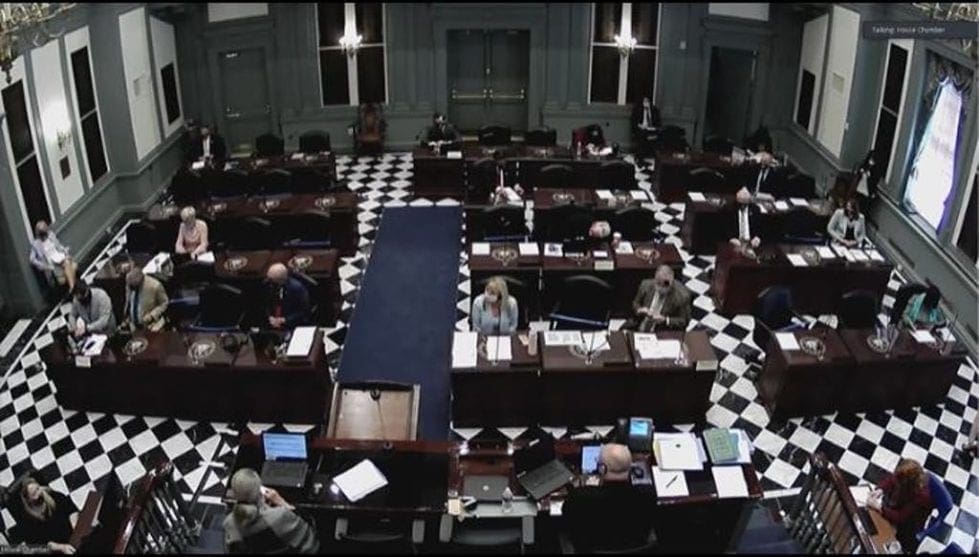

5 Republican bills in the House would reduce income, business taxes because of Delaware’s strong revenues
Delaware House Republicans have filed five bills that will cut taxes, saying the state should share its unexpected financial fortune with residents and businesses.
Among other things, the bills would cut the state personal income tax by 10%, cut corporate income tax by nearly 30%; and slash the gross receipts tax – which companies pay on sales – by 50%.
That would allow impacted taxpayers to collectively retain more than $420 million annually, the Republicans said in a press release Tuesday.
“This is an economic development bill,” said Rep. Rich Collins, R-Millsboro, is sponsoring House Bill 91, which would do those things. “In recent years, Delaware has had one of the worst economic growth rates in the nation. I believe allowing people and businesses to keep more of their own money will jumpstart investment, increase employment, and raise starting wages. The state will reap the benefits of this too, as better economic performance produces higher revenue.”
Efforts were not successful Tuesday to reach Democratic leadership for comment on the bills.
The Republicans said in their press release that the State of Delaware is flush with cash and they want to share it with taxpayers.
The Delaware Economic and Financial Advisory Council, a nonpartisan group responsible for estimating state revenue, have said the state’s revenues grew more than expected because of much higher than normal real estate transfers, higher than expected personal income and high corporate taxes through the COVID-19 pandemic. It said last month that the state will have a $1 billion surplus.
Under Executive Order 21 – which limits spending, linking it to population growth and inflation – the state is expected to end this fiscal year with nearly $844 million set aside as a hedge against an unexpected emergency or economic downturn, the press release said.
Republicans pointed out that state revenues for fiscal year 2021, which ends June 30, are expected to be $5.259 billion. The economy is expected to slow, but revenue projections for the state’s 2022 and 2023 fiscal years are now projected at $5.152 billion and $5.115 billion.
HB 191, which only has Republicans sponsors, is pending action in the House Revenue & Finance Committee.
Killing state part of transfer tax
House Bill 172, sponsored by State Rep. Lyndon Yearick, R-Camden/Woodside) would temporarily eliminate the state’s portion of the realty transfer tax for certain first-time home buyers.
The bill would apply to people with a gross income of less than $45,000 for single buyers or less than $75,000 in combined income for joint purchasers on houses that cost $250,000 or less. The bill would expire Dec. 31, 2022.
Eight Republicans and one Democrat are sponsoring the bill, which is awaiting a hearing in the House Revenue & Finance Committee. The Controller General’s office has not yet completed its cost estimate for the measure.
Low-income tax credit
Yearick’s House Bill 158 would establish Delaware Resident Low Income Tax Credit. That would create a $500 tax credit for low income Delawareans. In the case of spouses filing a joint return, the tax credit would be $1,000.
Individuals earning between $18,000 and $30,000 annually would qualify, as would spouses filing jointly with household incomes of between $36,000 to $60,000. Additionally, a $110 personal tax credit currently available to certain low-income Delawareans would be increased to $500.
If the value of the credit exceeded the tax owed by the individual, he or she would receive the remaining value in the form of a tax refund.
With only Republican sponsors, the bill s awaiting consideration of the House Revenue & Finance Committee. The cost estimate for the legislation has not yet been completed.
“I am committed to supporting our working poor with my bills to reduce the realty tax, create a new tax credit, and increase an existing personal tax credit,” Yearick said. “These proposals encourage work, offset the tax increases we implemented in 2017, and support individuals and families.”
Restoring senior tax credit
House Bill 108 would restore the $500 senior real property tax credit that was lowered in 2017t to $400. A fiscal note completed last year reveals the bill would return about $4.4 million annually to qualifying Delaware seniors.
The bill, sponsored by State Rep. Mike Ramone, R-Pike Creek South, has bipartisan support and has been pending action by the House Administration committee since late February.
Reducing transfer tax
Another bill sponsored by Ramone, House Bill 71, would decrease the realty transfer tax in Delaware by 25%.
In 2017, the tax was effectively raised from 3% of the purchase price of a property to 4%. (Local governments are responsible three-eighths of this total, with the state accounting for the remainder.)
House Bill 71 would reset the state’s take to its pre-Aug, 1, 2017 level, restoring the effective combined realty transfer tax to 3%.
When fully implemented in FY 2024, HB 71 would allow homebuyers to collectively keep an estimated $83 million. The bill only has Republican sponsors now and has been waiting for action in the House Revenue & Finance Committee for more than four months.
“These bills are two initiatives that I have been relentlessly fighting for over the past few years,” Ramone said. “With an extraordinarily improved revenue picture this year, there should be no reason to delay implementation of either proposal.”


Betsy Price is a Wilmington freelance writer who has 40 years of experience, including 15 at The News Journal in Delaware.
Share this Post



